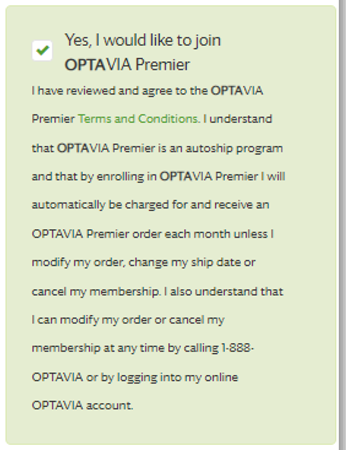Venable's Autorenewal Solutions Team (VAST) is closely tracking autorenewal lawsuits and enforcement actions.
Last week, a class action was filed in California state court alleging that Optavia, a multilevel marketing (MLM) company selling weight loss products and services, violated California's Automatic Renewal Law (ARL). The case, which was previously filed in federal court, was re-filed in state court last week.
The plaintiffs allege that customers can enroll in Optavia's Premium monthly subscription program through interactions with coaches. Coaches are trained to learn more about consumers' weight loss and health goals; describe the health and weight loss benefits of the products; and instruct consumers on how to use the products (e.g., what food to eat, timing of meals, recipes to use).
The coaches were allegedly trained to take a consumer's payment information and place an order for the consumer using the Optavia website and enrolling him or her in the Optavia Premier subscription program—which can cost up to $500 per month.
The problem, according to plaintiffs, is that the defendants allegedly told coaches to suggest to consumers that they are placing a single one-time order, rather than enrolling in an automatically renewing subscription. The plaintiffs allege that Optavia trains coaches to give disclosures on weight loss and health goals but does not train them to comply with the ARL. Instead, according to the class action, the company trains coaches to misleadingly suggest that the customer is only placing an initial order, when in reality the website automatically enrolls the customer for recurring orders. The plaintiffs alleged that the coaches failed to disclose:
- That Optavia Premier is a subscription program with automatic renewal terms
- That delivery of Optavia products and services will continue every month until canceled
- Optavia Premier's cancellation policy and terms
- That recurring charges will be charged to the plaintiffs' payment method every month in a specific amount
- That monthly delivery of the products and services with associated charges will be continuous, with no expiration date
Next, the plaintiffs alleged that Optavia did not obtain customers' "affirmative consent" to the automatic renewal terms, including on its website and when the coaches enroll customers in the program. The plaintiff alleged that the following checkbox failed to obtain affirmative consent:

According to the complaint, the box to enroll in the Optavia Premier continuity program was pre-checked, which plaintiffs alleged "is the opposite of how an affirmative consent box is supposed to work. It is designed to, and does, cause reasonable consumers to miss the fact that they are being auto-enrolled." Further, to unenroll from Optavia Premier, the consumer must affirmatively uncheck the box. In other words, according to the plaintiffs, "instead of affirmative consent (which is legally required), the process requires affirmative opt-out (which is illegal)."
Finally, the plaintiffs argued that the defendant failed to provide an acknowledgment email containing all disclosures required by California law. Although Optavia sent an acknowledgment email, it did not inform the consumer about Defendant's autorenewal policy or cancellation policy. Most notably, according to plaintiffs, the acknowledgment email "does not inform the consumer that she has enrolled in Optavia Premier and that it is a membership program that will charge her payment method on a recurring and monthly basis."
Want to learn more about automatic renewals, continuous service, and negative option offers? Venable's Autorenewal Solutions Team (VAST) has you covered. Visit Venable.com/VAST. Missed our March webinar on automatic renewal updates? Click here. To learn more about Venable's Advertising Law services, click here. Listen to the Ad Law Tool Kit Show—a new podcast from Venable—including Episode 3, "Negative Option and Continuity Marketing."